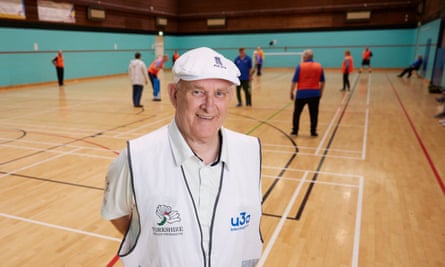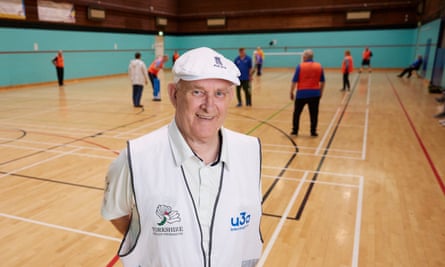
After a busy, varied career, Mac McKechnie was keen to prepare for retirement. Following a spell in the army, he had worked for a charity and in offender management, and enjoyed “seven very happy years as a magician and children’s entertainer”. At 66, he was contemplating life after finishing his “high-pressure” job managing mental health services in Wakefield. “I know a lot of people who become almost reclusive when they retire, because they’ve got nothing to do,” he says. “It’s easy to sit around watching daytime TV and before you know it you start getting up at 9 o’clock, 10 o’clock … I didn’t want that kind of lifestyle.”
So McKechnie and his wife planned ahead. “I got an allotment, I got a little dog, we had a touring caravan, we thought we’d do a lot of travelling …” He also joined U3A – the national network of learning groups for older people – and started both a magic group and a German language group, sharing skills he had acquired over his lifetime.
“That was OK,” he says, “until sepsis got me.” In 2018, McKechnie was hospitalised and became extremely ill. “Sepsis affects all of your organs – it’s not a good thing at all. To be honest, it was a close shave.” Weak, but starting to work on his recovery, McKechnie mulled over the consultant’s advice that he should lose some weight and get fitter. “I discounted ‘lose a bit of weight’ – they always say that! But I thought I could be a bit fitter, yeah.”
McKechnie investigated what sports U3A offered and tried a “walking football” session. It was not a success, not least because the players weren’t actually walking. “They were running around like lunatics. When I picked myself up for the third time, I thought: ‘I wish that was my sport – cricket.’” McKechnie had played to a good level in the army and later in a local league. He started wondering how the game could be adapted to be suitable for his age group but remain as close to traditional cricket as possible. Research online yielded little, so: “I set about designing the rules from scratch.”
He had a clear vision. “It had to be totally inclusive and include women as well. I didn’t want to go down the line of using protective equipment because expense is a big factor – we’re all retired and on pensions.” Most importantly, the game had to be about more than just sport: mental wellbeing and alleviating isolation were key aims.
When McKechnie had a concept sketched out, he canvassed interest from U3A members near him in Barnsley. “On a very cold, wet 5 January 2019”, when McKechnie was 68, walking cricket was born. “Obviously, I was nervous it wouldn’t work. We never knew how it would go until it started. But people just seemed to love it. It was an immediate hit. I thought: ‘This has got legs!’”

He contacted local media and the Yorkshire Cricket Foundation to get their support, and with them on board – plus McKechnie’s boundless drive and enthusiasm – the sport started to spread. There are now teams “all over Yorkshire” and beyond, and a more competitive “green field” version of the game, also invented by McKechnie, has been adopted by many cricket clubs. McKechnie has introduced walking cricket to older women in Asian communities in Bradford and Leeds. He’s especially fond of his Leeds group: “The oldest player is 101!”
Consistent with his initial vision, McKechnie says: “The social aspect is more important than the cricket itself. There’s at least a quarter or half an hour for the teas, coffees, biscuits and the glorious cakes that people bring. When they come off the field, people forget what the score was – but it doesn’t matter! People have gentle exercise, a good laugh, have fun – and that’s the main thing.”
As social prescribing becomes increasingly popular, McKechnie says he would like to see more of it focus on truly social activities. A widely prescribed activity such as swimming may be good for physical wellbeing, “but what about the social benefits, alleviating isolation and maintaining mental health? That’s what we’re tackling.” The University of Huddersfield is currently conducting research on the wellbeing impact of walking cricket.
Sadly for McKechnie himself, recurrent mobility issues mean he is no longer able to play the game he invented. Undeterred, he has trained as an umpire. “I think I’m the oldest person who’s ever become a registered umpire,” he says. Walking cricket, in any case, is only one of his passions. He trained and was ordained as a Methodist minister at 65. “It was a three-year course, which I completed in four months because I worked day and night at it.” McKechnie is now the pastor of Staincross Christian Fellowship in Barnsley and has published a book of sermons. He has also written and published a children’s book, and his first science fiction novel, Race to the Stars, will be published this year.
McKechnie’s newest project is learning the guitar; one of his grandchildren plays, so this January he started a U3A beginners’ group. “I set a goal that we would have our first gig on 5 June to an audience of 350 people. I’ve brought that forward now to 22 April.” Does he have more energy than most? “Possibly. I’m always looking for new things to try. My wife keeps telling me: ‘Stop it!’” She’s busy herself, he says, though she “cannot stand cricket. We have different interests, but we’ve also got each other, which is the main thing.”



